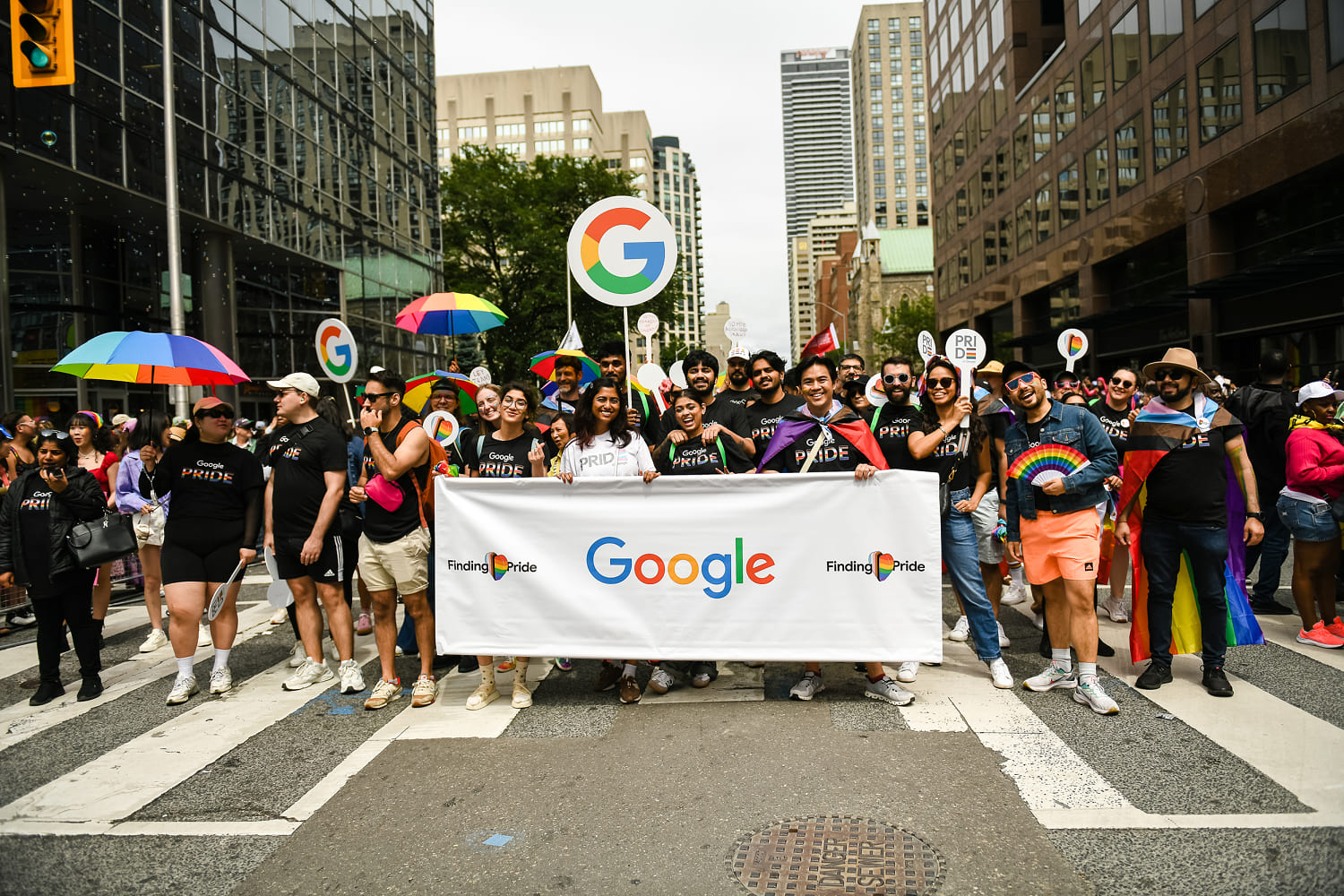The Dictatorship
Google’s calendar no longer recognizes Pride Month. I’m OK with that.

President Donald Trump’s first few weeks in office have included an aggressive push to erase diversity, equity and inclusion initiatives across the federal government, a movement that has swiftly been adopted by some businesses as well. Google’s parent company, Alphabet, scrubbed language about DEI initiatives from various reports. At the same time, some Google Calendar users noticed that cultural observances like Pride Month and Black History Month no longer appeared as defaults events on the app.
This observation led to a surge in backlash from users decrying what seemed to be another capitulation to Trump. But Google clarified it actually removed these types of default observances back in mid-2024, because “maintaining hundreds of moments manually and consistently globally wasn’t scalable or sustainable.” Whether causality or correlation, Google’s decision to remove Pride Month from its calendar application does not mean that Pride is dead.
A digital application is not reality. It does not dictate our time — how we, as a community, choose to celebrate who we are and our history.
A digital application is not reality. It does not dictate our time — how we, as a community, choose to celebrate who we are and our history. A cultural-observation tab is not a public space — that tab does not control our social interactions, or where or why or how we come together. And certainly, Pride Month’s former “inclusion” did not realize the political and social belonging — which I define not as a static feeling but as an intentional practice that creates a space of mutual respect — that the LGBT community needs and demands, now more than ever.
Let us remember: The first Pride parade was a commemoration of the human dignity and the communal power found in the resistance to police brutality and intimidation at not just Stonewall in 1969 but also Compton’s Cafeteria in 1966 and Dewey’s restaurant in 1965. The first media mention of “Pride Month,” according to research conducted by journalists Brooke Sopelsa and Isabela Espadas Barros Leal, was in a June 5, 1972, issue of Pennsylvania’s Delaware County Daily Times. The New York Times reported in a June 2, 1989, article that “Mayor Edward I. Koch proclaimed the month of June as Lesbian and Gay Pride and History Month.”
But pride is not just an event. As I wrote for the Women’s Media Center“pride is a personalandsocial feeling. According to Merriam-Websterit is both self-respect — ‘confidence and satisfaction in oneself’ — and the ‘pleasure that comes from some relationship, association, achievement, or possession that is seen as a source of honor, respect, etc.’ In a way, pride is the dignity each person finds in our creative self-determination and the pleasure and joy in sharing in the self-expression of authenticity with others.”
No company or CEO or president, for that matter, determines our pride.
For years, the mainstream gay community has sated itself on rainbow beads thrown from corporate Pride floats and other empty, performative gestures suggestive of some kind of real, consequential corporate accountability to the LGBTQ+ community at large. That we now look to corporations for this dignity and care also signifies a broader societal shift of relying on other sectors, including corporations, for the services — the housing, the health care, the education — that our government has the responsibility to provide to its citizens through public goods and infrastructure. (A responsibility it more egregiously shirked after the Civil Rights Movement fought, and won, to expand post-World-War-II public investmentsspecifically in education and housing, to include Black Americans.) That we, in America, pay taxes yet have to rely on the charity of our employers for health insurance is a disgrace and an injustice. In this reliance on the for-profit sector, we have confused the modus operandi of business — profit — for that of government.
As unfortunate as it is, I have lived in the heart of Silicon Valley for more than eight years, and it was no surprise to me that many of the tech bros who own these companies — including Meta’s Mark Zuckerberg, Apple CEO Tim Cook and OpenAI’s Sam Altman — donated millions of dollars to an authoritarian’s inauguration fund and are already looking for ways to show their fealty. (Google, for the record, also donated $1 million to the fund.) These actions epitomize what M. Gessen brilliantly outlined as the five types of anticipatory obedience that build autocratic power.
A digital calendar application tab, a rainbow profile pic frame for your social media accounts — these are virtual ephemera.
Complicity is the cornerstone of Silicon Valley’s liberal corporate ethos. And the much-lauded archetype known as the “disruptor” is not the person who disrupts systems and institutions in the name of justice. The disruptor does not disrupt hierarchies or cultural norms. No. This person is a disruptor because this person circumvents ethical and organizational rules and regulations in the name of profit.
A digital calendar application tab, a rainbow profile pic frame for your social media accounts — these are virtual ephemera, neither effective nor significant as forms of representation. They do not transform institutions or eradicate the many forms of historical discrimination that plague our society.
The American government is attacking its citizens, especially LGBTQ Americans and anyone else it can “other.” Trump is signing executive order after executive order to dehumanize the trans community and strip trans Americans of their freedom to secure the health care they need. We need to focus our energy and our efforts on real harms, not virtual nothings.
If anything, the significance of this calendar application’s removal is that it should make us re-examine how we, as members of the LGBTQ+ community, understand our political and social power as part of a larger strategic vision to build a more free and just society.
And if it’s remembering holidays you’re worried about, might I suggest a different calendar. I have my 2025 Astro Planner from Chani Nicholas right here as proof. “Pride Month begins,” it reads, right on June 1. We’ll be just fine.
Marcie Bianco is a writer and editor based in California. She is the author of “Breaking Free: The Lie of Equality and the Feminist Fight for Freedom.”
The Dictatorship
Changes to the US vaccine recommendations are sowing confusion and could harm kids

Dr. Molly O’Shea has noticed growing skepticism about vaccines at both of her Michigan pediatric offices and says this week’s unprecedented and confusing changes to federal vaccine guidance will only make things worse.
One of her offices is in a Democratic area, where more of the parents she sees are opting for alternative schedules that spread out shots. The other is in a Republican area, where some parents have stopped immunizing their children altogether.
She and other doctors fear the new recommendations and the terminology around them will stoke vaccine hesitancy even more, pose challenges for pediatricians and parents that make it harder for kids to get shots, and ultimately lead to more illness and death.
The biggest change was to stop blanket recommendations for protection against six diseases and recommend those vaccines only for at-risk children or through something called “shared clinical decision-making” with a health care provider.
The phrase, experts say, is confusing and dangerous: “It sends a message to a parent that actually there’s only a rarefied group of people who really need the vaccine,” O’Shea said. “It’s creating an environment that puts a sense of uncertainty about the value and necessity or importance of the vaccines in that category.”
Health Secretary Robert F. Kennedy Jr.who helped lead the anti-vaccine movement for years, said in announcing the changes that they better align the U.S. with peer nations “while strengthening transparency and informed consent.”
But doctors say they are sowing doubt — the vaccines have been extensively studied and proven to be safe and effective at shielding kids from nasty diseases — at a time when childhood vaccination rates are already falling and some of those infectious diseases are spreading.
On Friday, the American Academy of Pediatrics and more than 200 medical, public health and patient advocacy groups sent a letter to Congress about the new childhood immunization schedule.
“We urge you to investigate why the schedule was changed, why credible scientific evidence was ignored, and why the committee charged with advising the HHS Secretary on immunizations did not discuss the schedule changes as a part of their public meeting process,” they wrote.
Many don’t know what ’shared decision-making’ means
O’Shea said she and other pediatricians discuss vaccines with parents at every visit where they are given. But that’s not necessarily “shared clinical decision-making,” which has a particular definition.
On its website, the Advisory Committee on Immunization Practices says: “Unlike routine, catch-up, and risk-based recommendations, shared clinical decision-making vaccinations are not recommended for everyone in a particular age group or everyone in an identifiable risk group. Rather, shared clinical decision-making recommendations are individually based and informed by a decision process between the health care provider and the patient or parent/guardian.”
In this context, health care providers include primary care physicians, specialists, physician assistants, nurse practitioners, registered nurses and pharmacists.
A pair of surveys conducted last year by the Annenberg Public Policy Center at the University of Pennsylvania suggested that many people don’t fully understand the concept, which came up last year when the federal government changed recommendations around COVID-19 vaccinations.
Only about 2 in 10 U.S. adults knew that one meaning behind shared decision-making is that “taking the vaccine may not be a good idea for everyone but would benefit some.” And only about one-third realized pharmacists count as health care providers to talk with during the process, even though they frequently administer vaccines.
As of this week, vaccines that protect against hepatitis A, hepatitis B, rotavirus, RSV, flu and meningococcal disease are no longer universally recommended for kids. RSV, hepatitis A, hepatitis B and meningococcal vaccines are recommended for certain high-risk populations; flu, rotavirus, hepatitis A, hepatitis B and meningococcal vaccines are recommended through shared decision-making — as is the COVID-19 vaccine, although that change was made last year.
Shortly after the federal announcement Monday, Dr. Steven Abelowitz heard from half a dozen parents. “It’s causing concern for us, but more importantly, concern for parents with kids, especially young kids, and confusion,” said Abelowitz, founder of Ocean Pediatrics in Orange County, California.
Though federal recommendations are not mandates — states have the authority to require vaccinations for schoolchildren — they can affect how easy it is for kids to get shots if doctors choose to follow them.
Under the new guidelines, O’Shea said, parents seeking shots in the shared decision-making category might no longer bring their kids in for a quick, vaccine-only appointment with staff. They’d sit down with a health care provider and discuss the vaccine. And it could be tougher to have a flu clinic, where parents drive up and kids get shots without seeing a doctor.
Staying the course as challenges mount
Still, doctors say they won’t let the changes stop them from helping children get the vaccines they need. Leading medical groups are sticking with prior vaccine recommendations. Many parents are, too.
Megan Landry, whose 4-year-old son Zackary is one of O’Shea’s patients, is among them.
“It’s my responsibility as a parent to protect my child’s health and well-being,” she said. “Vaccines are a really effective and well-studied way to do that.”
She plans to keep having the same conversations she’s always had with O’Shea before getting vaccines for Zackary.
“Relying on evidence and trusted medical guidance really helps me to make those decisions,” she said. “And for me, it’s not just a personal choice for my own son but a way to contribute to the health of everybody.”
But for other families, confidence about vaccines is waning as trust in science erodes. O’Shea lamented that parents are getting the message that they can’t trust medical experts.
“If I take my car to the mechanic, I don’t go do my own research ahead of time,” she said. “I go to a person I trust and I trust them to tell me what’s going on.”
Abelowitz, the California doctor, likened the latest federal move to pouring gasoline on a fire of mistrust that was already burning.
“We’re worried the fire’s out of control,” he said. “Already we’ve seen that with measles and pertussis, there are increased hospitalizations and even increasing deaths. So the way that I look at it — and my colleagues look at it — we’re basically regressing decades.”
___
The Associated Press Health and Science Department receives support from the Howard Hughes Medical Institute’s Department of Science Education and the Robert Wood Johnson Foundation. The AP is solely responsible for all content.
The Dictatorship
U.S. launches fresh strikes on ISIS targets in Syria

The U.S. has carried out “large-scale strikes” against multiple Islamic State targets in Syria along with partner forces, U.S. Central Command said on Saturday.
The attack is a part of an operation launched on Dec. 19, when U.S. forces struck “more than 70 targets” in central Syria as retaliation for the killing of three Americans by an ISIS gunman in early December.
“The strikes today targeted ISIS throughout Syria as part of our ongoing commitment to root out Islamic terrorism against our warfighters, prevent future attacks, and protect American and partner forces in the region,” CENTCOM said in a statement.
Tom Barrack, the Trump administration’s special envoy for Syria, announced on Saturday that he met with Syria’s new leadership in Damascus “to discuss recent developments in Aleppo and the broader path forward for Syria’s historic transition.”
The deadly attack in December marked the first fatalities of U.S. troops in the country since former President Bashar al-Assad was ousted last year. Three other U.S. service members were injured in the attack in December, and a state-run news agency reported that two members of the Syrian security forces were also wounded.
President Donald Trump said at the time that the attack by ISIS took place “in a very dangerous part of Syria, that is not fully controlled by them.” He also said Syrian President Ahmed al-Sharaa, whom he had met in November at the White House, was “extremely angry and disturbed by this attack.”
Defense Secretary Pete Hegseth said last month that the operation was “a declaration of vengeance” over the deaths of the American service members.
This is a developing story. Please check back for updates.
Clarissa-Jan Lim is a breaking news reporter for MS NOW. She was previously a senior reporter and editor at BuzzFeed News.
The Dictatorship
When it comes to ICE encounters, what are the rules — and your rights?

In the wake of Renee Nicole Good’s death, Americans are asking, with heightened urgency, what authority ICE and CBP agents have when they engage with U.S. citizens. And as with many areas of the law, the answer is largely, “It depends.”
Can ICE use deadly force on U.S. citizens – or ever?
When it comes to the use of force, and specifically, the use of firearms, ICE has its own specific policy that was last updated in 2023. That policy was filed in the Chicago-area litigation over ICE and CBP’s treatment of protesters, clergy, and journalists. (Interestingly, on ICE’s website, that same policy is almost entirely redacted.) This policy does not vary depending on the subject’s immigration or citizenship status. Here’s what it says:
First, the policy authorizes the use of force “only when no reasonably effective, safe, and feasible alternative appears to exist and may use only the level of force that is objectively reasonable in light of the totality of facts and circumstances confronting the officer at the time force is applied.” But the policy is equally clear that an officer does not have to meet force with equal or lesser force, does not have to wait for an attack before using force, and does not have any duty to retreat to avoid the reasonable use of force.
Second, where feasible and without creating any greater threat to his own safety or that of others, an ICE officer must attempt to “de-escalate by the use of communication or other techniques during an encounter to stabilize, slow, or reduce the intensity of a potentially violent situation without using physical force, or with a reduction in force.”
Third, ICE policy is also clear that officers have a “duty to intervene to prevent or stop a perceived use of excessive force” so long as it is safe to do so. It further states that a failure to intervene and/or report such incidents is itself misconduct — and potential grounds for discipline.
What’s the guidance if U.S. citizens are given orders by ICE?
Short of using force or deadly force, however, can ICE give orders to U.S. citizens? For example, it appears that ICE agents directed Renee Nicole Good to get out of her car shortly before she was killed.
ICE can give orders to U.S. citizens, but again, only in limited circumstances that are directly tied to the ICE agent’s immigration-related authority. For example, ICE can give orders to U.S. citizens — or even detain them temporarily — if they are obstructing or interfering with immigration enforcement activity.
These situations are often very subjective. U.S. citizens do have significantly more freedom in their interactions with ICE than non-citizens. For example, according to guidance issued by the ACLU and the City of New Yorkamong others, if ordered or detained by ICE, a U.S. citizen can ask, “Am I free to leave?” and they should then be allowed to leave on their own free will.
Can ICE agents search a car without a warrant?
ICE agents also have the authority to search a car without a warrant in limited scenarios. The Fourth Amendment includes the automobile exceptionwhich allows federal agents to search a vehicle without a warrant if there’s probable cause to believe there’s evidence to a crime or contraband. Because a car can be driven away quickly, it may not be practical to secure a warrant beforehand without jeopardizing the investigation.
But federal agents must have specific probable cause to search a car without a warrant. A hunch or a feeling that the car conceals evidence of illegal activity is not enough for a federal agent to search a car without a warrant. ICE does have broader authority to search vehicles within 100 miles of the U.S. border, but even so, these searches typically require probable cause. Notably, ICE cannot search a car without a warrant simply because they suspect someone may be an undocumented immigrant.
However, car searches are the only major exception. ICE officers require search warrants for all other searches. Without a warrant, both U.S. citizens and non-citizens can say, “I do not consent to a search,” according to guidance issued by immigration rights organizations.
What’s the guidance on U.S. citizens recording or taking photos of ICE during enforcement activities?
Civil liberties groups generally advise that under the First Amendment, U.S. citizens can record or take photos of ICE performing law enforcement activities in public places so long as the recording does not interfere with ICE activity, like an arrest. Bystanders are allowed by law to collect important information, including names and badge numbers of the ICE agent executing the immigration activity.
Some states, including Florida, Tennessee, and Louisiana, have enacted their own laws requiring observers — or anyone else — to move back 25 feet or more from law enforcement or other first responders upon their request. While other, similar laws passed by Arizona and Indiana have been struck down, the constitutionality of these states’ laws has not been determined.
Finally, citizens and non-citizens alike share one fundamental right when it comes to encounters with ICE, or any other law enforcement agency, for that matter: the right to remain silent.
Lisa Rubin is MS NOW’s senior legal reporter and a former litigator.
Fallon Gallagher is a legal affairs reporter for MS NOW.
-

 The Dictatorship11 months ago
The Dictatorship11 months agoLuigi Mangione acknowledges public support in first official statement since arrest
-

 The Dictatorship4 months ago
The Dictatorship4 months agoMike Johnson sums up the GOP’s arrogant position on military occupation with two words
-

 Politics11 months ago
Politics11 months agoBlue Light News’s Editorial Director Ryan Hutchins speaks at Blue Light News’s 2025 Governors Summit
-

 Politics11 months ago
Politics11 months agoFormer ‘Squad’ members launching ‘Bowman and Bush’ YouTube show
-

 Politics11 months ago
Politics11 months agoFormer Kentucky AG Daniel Cameron launches Senate bid
-

 The Dictatorship11 months ago
The Dictatorship11 months agoPete Hegseth’s tenure at the Pentagon goes from bad to worse
-
Uncategorized1 year ago
Bob Good to step down as Freedom Caucus chair this week
-

 Politics9 months ago
Politics9 months agoDemocrat challenging Joni Ernst: I want to ‘tear down’ party, ‘build it back up’




